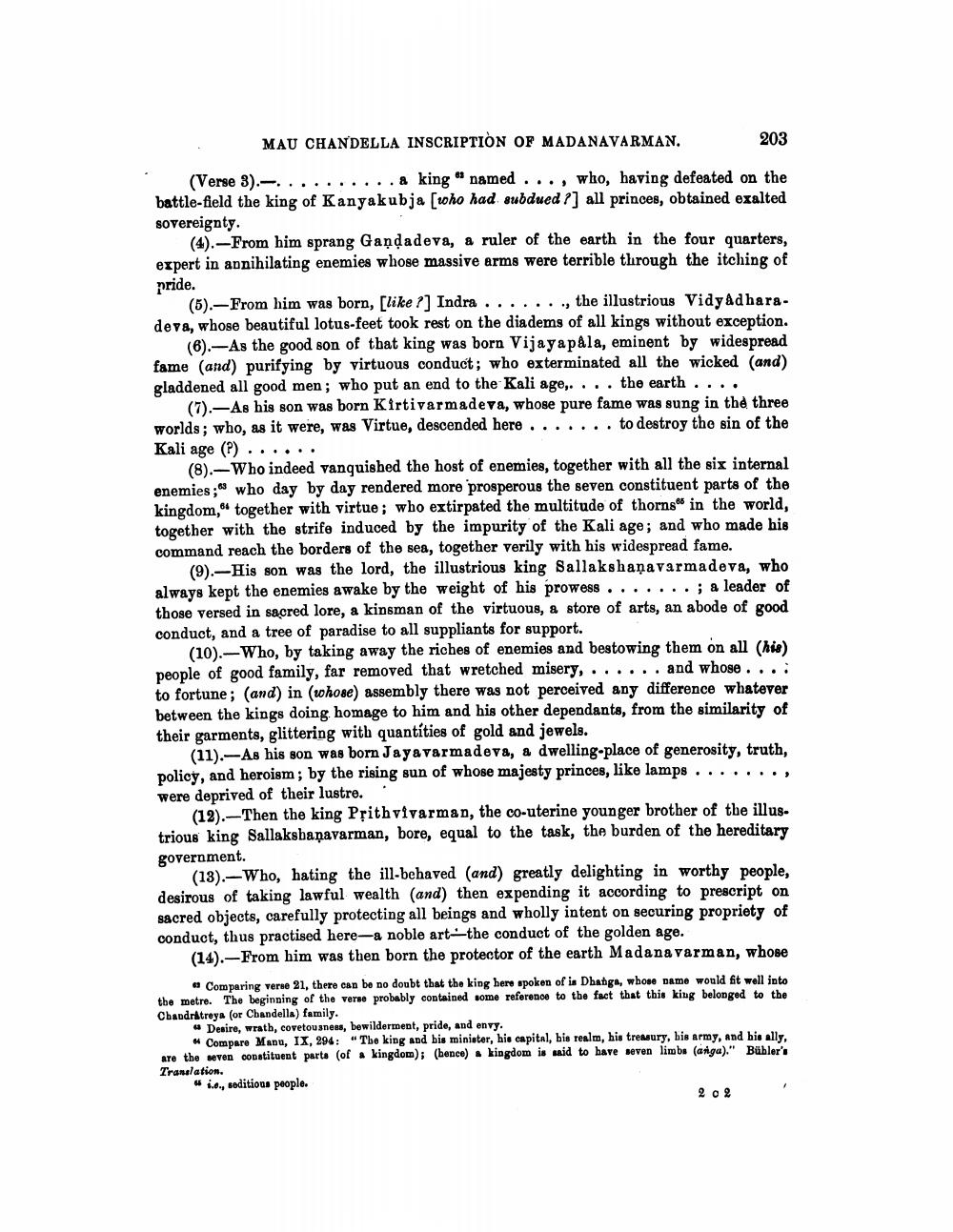________________
MAU CHANDELLA INSCRIPTION OF MADANAVARMAN.
203
(Verse 3).-.. ... a king" named . . ., who, having defeated on the battle-field the king of Kanyakubja [who had subdued?] all princes, obtained exalted Sovereignty.
(4). From him sprang Gandadeva, a ruler of the earth in the four quarters, expert in annihilating enemies whose massive arms were terrible through the itching of pride.
(5). From him was born, [like ?] Indra. . . . . . ., the illustrious Vidyadharadeva, whose beautiful lotus-feet took rest on the diadems of all kings without exception.
(6)-As the good son of that king was born Vijayapala, eminent by widespread fame (and) purifying by virtuous conduct; who exterminated all the wicked (and) gladdened all good men; who put an end to the Kali age,.... the earth. . . .
(7). As his son was born Kirti varmadeva, whose pure fame was sung in the three worlds; who, as it were, was Virtue, descended here. . . . . . . to destroy the sin of the Kali age (?)......
(8). Who indeed vanquished the host of enemies, together with all the six internal enemies; who day by day rendered more prosperous the seven constituent parts of the kingdom, together with virtue; who extirpated the multitude of thorns in the world, together with the strife induced by the impurity of the Kali age; and who made his command reach the borders of the sea, together verily with his widespread fame.
64
(9). His son was the lord, the illustrious king Sallakshanavarmadeva, who always kept the enemies awake by the weight of his prowess. . . .. ..; a leader of those versed in sacred lore, a kinsman of the virtuous, a store of arts, an abode of good conduct, and a tree of paradise to all suppliants for support.
(10). Who, by taking away the riches of enemies and bestowing them on all (his) people of good family, far removed that wretched misery, . . . . . . and whose . . . . to fortune; (and) in (whose) assembly there was not perceived any difference whatever between the kings doing homage to him and his other dependants, from the similarity of their garments, glittering with quantities of gold and jewels.
(11).-As his son was born Jayavarmadeva, a dwelling-place of generosity, truth, policy, and heroism; by the rising sun of whose majesty princes, like lamps.... were deprived of their lustre.
(12). Then the king Prithvivarman, the co-uterine younger brother of the illustrious king Sallakshanavarman, bore, equal to the task, the burden of the hereditary government.
(13) Who, hating the ill-behaved (and) greatly delighting in worthy people, desirous of taking lawful wealth (and) then expending it according to prescript on sacred objects, carefully protecting all beings and wholly intent on securing propriety of conduct, thus practised here-a noble art-the conduct of the golden age.
(14). From him was then born the protector of the earth Madana varman, whose
Comparing verse 21, there can be no doubt that the king here spoken of is Dhanga, whose name would fit well into the metre. The beginning of the verse probably contained some reference to the fact that this king belonged to the Chandratreya (or Chandella) family.
Desire, wrath, covetousness, bewilderment, pride, and envy.
4 Compare Manu, IX, 294: "The king and his minister, his capital, his realm, his treasury, his army, and his ally, are the seven constituent parts (of a kingdom); (bence) a kingdom is said to have seven limbs (anga)." Bühler's Translation.
65 i.e., seditious people.
202




